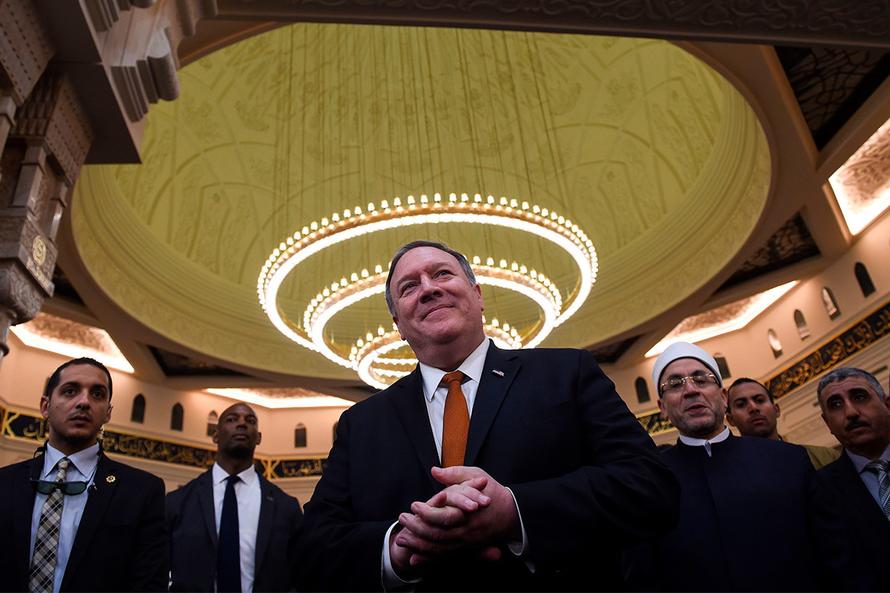Why is Pompeo working full-time for Israel?
Pompeo Announces International Summit On Iran To Address “Destabilizing Influence”
ZeroHedge.com
Continuing his eight day tour of the Middle East which kicked off with a speech at Cairo University, Secretary of State Mike Pompeo has announced the United States will host an international summit next month focusing on Middle East security and Iran’s regional influence in what appears the latest attempt to reassure allies like Israel and Saudi Arabia that in pulling out of Syria the US will still seek to prevent Iranian expansion and entrenchment in the region. In total Pompeo will visit nine nations, including Gulf GCC countries were he’s expected to continue a heavily anti-Iran message to allies.
In an interview with FOX while speaking from Cairo, Pompeo said the international gathering would take place Feb. 13 to Feb. 14 in Poland to “focus on Middle East stability and peace and freedom and security here in this region, and that includes an important element of making sure that Iran is not a destabilizing influence.”

“We’ll bring together dozens of countries from all around the world,” he added, noting that invitees would include leaders from Asia, Africa, the Western Hemisphere, Europe and the Middle East, according to FOX. The White House has in recent months sought to keep up an intense “pressure campaign” on Iran and new sanctions after pulling out of the 2015 nuclear deal.
The US has also warned Iran to cease it’s “illegal” space program to launch satellites into orbit, saying the ballistic technology used in tests and launches only serve to further Iran’s nuclear delivery capability. Early this month Pompeo threatened Iran via Twitter statement over plans to fire off Space Launch Vehicles which possessed, as Pompeo claimed, “virtually the same technology as ICBMs” in a “defiant” launch that will “advance its missile program” — a threat which Tehran rebuffed.
Notably, France on Friday affirmed Pompeo’s warning, and in a statement condemned Iran’s upcoming space launches. After Iran again announced it plans to put two satellites into orbit in the coming weeks, Foreign ministry spokeswoman Agnes von der Muhll told reporters, “France recalls that the Iranian missile program is not conform with U.N. Security Council Resolution 2231,” and added, “It calls on Iran to immediately cease all ballistic missile-related activities designed to carry nuclear weapons, including tests using ballistic missile technology.”
Iran, for its part, has always maintained it is free to develop a “peaceful” space program, pointing out that the wording of the UN resolution leaves open the possibility of missile development programs unrelated to the delivery of nuclear weapons.
The resolution says that Iran “is called upon” not to undertake any activity related to ballistic missiles “designed to be capable” of nuclear warhead delivery while stopping short of explicitly banning the activity.
Meanwhile, on Friday the US Secretary of State arrived in Bahrain, after which he will visit the United Arab Emirates, where he’s expected to push both a unifying message among increasingly splintered Gulf allies amidst an ongoing dispute with Qatar and give reassurance that the US is not abandoning the region to Iranian influence by its Syria exit. Toward this end he’ll promote the administration’s idea of an “Arab NATO” to counter Iran in the broader Middle East.
Ahead of Pompeo’s tour of the Gulf states, the State Department issued a formal statement saying American partnerships with the members of the Gulf Cooperation Council (GCC) “are critical to achieving shared regional objectives: defeating ISIS, countering radical Islamic terrorism, protecting global energy supplies, and rolling back Iranian aggression.”
During the Friday FOX interview, Pompeo made some especially revealing comments about how the White House sees Syrian President Bashar al-Assad’s future:
Pompeo’s predecessor, Rex Tillerson, said in October 2017, that Syrian President Bashar al Assad had no role in Syria’s political future, but when asked whether that is still the U.S. position, Pompeo today said the Assad regime will be part of those conversations.
“We want to make sure all the options are open as that political discourse begins,” Pompeo said. “We are very hopeful that we will get the bad actors in the region, the Russians and the Iranians, to come to the table, along with the regime and all the other stakeholders in there to come to the table and have conversations about what a post-civil-war political structure might look like in Syria.”
Pomepo ultimately suggested the fate of Assad will be in the Syrian people’s hands, in what is perhaps the most significant acknowledgement of Washington’s complete turnaround on Assad to date. This as it appears President Trump’s promised US troop “full” and “immediate” withdrawal from Syria appears to finally be in motion.
